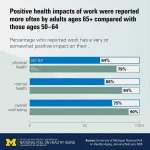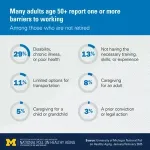(Press-News.org) Having a job – whether it’s working for someone else or being their own boss – gives older Americans more than just a way to earn money or get health insurance, a new poll finds.
More than two-thirds of those who work after age 50 say that working boosts their physical health, mental health, and/or their overall wellbeing, according to a new report from the University of Michigan National Poll on Healthy Aging.
Nearly half (46%) of those who work say that having a sense of purpose is a very important reason for doing so. The same percentage strongly agrees that working keeps their brain sharp.
Those who were still working past age 65 were more likely to report that work has very positive impacts on their health and well-being, and to strongly agree that working keeps their brain sharp.
Overall, 18% of poll respondents aged 65 and older said they work full- or part-time for an employer or are self-employed, compared with 63% of those aged 50 to 64. Of all those age 50 and over who are working, 69% said their work is all in-person, with the rest divided among those who work fully remotely or partially so. And 88% of those who work say they feel satisfied (45% very, 43% somewhat) with their job.
But the poll also spotlights the barriers to working faced by older adults and reveals that some experience negative effects.
Among people aged 50 and over who work, 33% say their job has a negative effect on their physical health, and 29% say it has a negative effect on their mental health. Among working adults who say their mental health is fair or poor, 22% say they can’t take time off from work for health-related appointments, compared with 7% of those reporting better mental health.
The poll is based at the U-M Institute for Healthcare Policy and Innovation, and supported by AARP and Michigan Medicine, U-M’s academic medical center.
“Our perceptions of working after age 65 have changed over time, and these data suggest that most older adults who are still able to work after the traditional retirement age derive health-related benefits from doing so,” said poll director Jeffrey Kullgren, M.D., M.P.H., M.S., a primary care physician at the VA Ann Arbor Healthcare System and associate professor of internal medicine at U-M. “As we learn more about how loneliness, lack of social connection and isolation intertwine with physical and mental health in older adults, the role of work is important to consider.”
In addition to the national poll report, the team compiled data for Michigan adults aged 50 and older compared with those in other states; an interactive data visualization is available at https://michmed.org/geZ3B. An article summarizing the Michigan findings is available here.
“Americans are living and working longer than ever before, with nearly 38 million older adults in the workforce today — more than two and a half times the number from 40 years ago,” said Carly Roszkowski, vice president of financial resilience at AARP. “This poll reinforces what we hear from older workers every day — that work provides more than just a paycheck. It offers purpose, connection and cognitive benefits. But barriers like age discrimination stand in the way.” See AARP work-related resources for people over 50 at www.aarp.org/work.
Barriers to work and negative experiences
The poll asked about barriers to work, both among those who work and among those who don’t currently work but also aren’t retired. The latter group includes 24% of people aged 50 to 64 and 5% of people aged 65 and over.
Overall, 39% of all non-retired older adults – whether they work for pay or not -- cited at least one barrier to working. Many cited multiple barriers. The percentage reporting at least one barrier was very high – more than 80% -- among those who aren’t working but aren’t retired.
Barriers included disability, chronic illness or poor health (29% of all non-retired older adults), lack of training, skills or experience (13%), limited transportation options (11%), caregiving for an adult (8%), caregiving for a child or grandchild (5%) or a prior conviction or legal action (3%).
The poll also asked all adults aged 50 and up who had worked in the past five years about their experiences related to work. Of this group, 26% thought their skills weren’t being fully utilized, 25% said the pay was too low to be worth their time, and 20% said their health insurance didn’t cover their needs. In addition, 13% felt their job was too physically demanding and 11% said they experienced age discrimination at work.
Other findings:
Very important reasons for working, among those 50 and older who work:
Financial stability: 78%
Save for retirement: 65%
Access to health insurance: 59%
Contribute to society: 26%
Impacts of work on health, among those 50 and older who work:
Very positive impact on physical health (32% age 65+ vs. 14% age 50-64)
Very positive impact on mental health (41% age 65+ vs. 20% age 50-64)
Very positive impact on well-being (39% age 65+ vs. 21% age 50-64)
Percent of older adults who work who strongly agree with specific benefits of working:
Helps keep their brain sharp (57% age 65+ vs. 43% age 50 to 64)
Helps maintain social connections (37% age 65+, 28% age 50-64)
Helps stay focused (40% age 65+, 28% age 50-64)
The poll findings come from a nationally representative survey conducted by NORC at the University of Chicago for IHPI and administered online and via phone in August 2024 among 3,486 adults ages 50 to 94 across the U.S. The sample was subsequently weighted to reflect the U.S. population. Read past National Poll on Healthy Aging reports and about the poll methodology.
END
As more Americans work later in life, poll shows positive health impacts, especially for those over 65
Majority of those who work after age 50 point to positive effects on wellbeing and physical and mental health, but others cite health-related barriers to work
2025-02-11
ELSE PRESS RELEASES FROM THIS DATE:
Is the Metaverse a new frontier for human-centric manufacturing?
2025-02-11
Is the Metaverse a new frontier for human-centric manufacturing?
The future of manufacturing is not just about machines and AI; it's about re-empowering humans, according to a new study from the University of Surrey.
The integration of advanced technologies like augmented reality (AR) and digital twins is set to redefine the workforce's role, making humans an essential part of the manufacturing equation once again.
The paper, published in Sustainability, explores the transformative potential of Metaverse technologies ...
When qubits learn the language of fiberoptics
2025-02-11
Qubits—the fundamental units of quantum information—drive entire tech sectors. Among them, superconducting qubits could be instrumental in building a large-scale quantum computer, but they rely on electrical signals and are difficult to scale. In a breakthrough, a team of physicists at the Institute of Science and Technology Austria (ISTA) has achieved a fully optical readout of superconducting qubits, pushing the technology beyond its current limitations. Their findings were now published in Nature Physics.
Following a year-long rally, ...
The prevalence of older Americans without disabilities increases substantially between 2008 and 2017
2025-02-11
Toronto, ON – A sizeable improvement was found in the prevalence of American adults aged 65 and older without disabilities -- including memory, hearing, visual, and functional disabilities or limitations in activities of daily living -- according to a new nationally representative study published online in the Archives of Gerontology and Geriatrics Plus found.
In total, 61% of older Americans reported being free from disability in 2008. The prevalence increased to 65% in 2017. While this may seem like a small increase, had the prevalence of individuals without disabilities remained ...
New study reveals hidden manic symptoms in one-fourth of schizophrenia patients
2025-02-11
THESSALONIKI, Greece, 11 February 2025 - In a notable Genomic Press research report, researchers at the Aristotle University of Thessaloniki have uncovered a significant presence of manic symptoms in patients with schizophrenia spectrum disorders (SSDs), offering valuable insights that could reshape treatment approaches.
The rigorous peer-reviewed study, published in Brain Medicine, examined 75 stable outpatients with SSDs, revealing that more than one in four patients (26.7%) exhibited distinct manic symptoms, a finding that ...
Does the universe behave the same way everywhere? Gravitational lenses could help us find out
2025-02-11
“The cosmological principle is like an ultimate kind of statement of humility,” explains James Adam, astrophysicist at the University of the Western Cape, Cape Town, South Africa, and lead author of the new paper. According to the Cosmological Principle, not only are we not at the center of the Universe, but a true center does not exist. A further assumption, similar to but distinct and independent from homogeneity, is that the Universe is also isotropic, meaning it has no preferred directions. These assumptions underlie the Standard Model of Cosmology, the theoretical ...
Majority support moderation on social media platforms
2025-02-11
Most people want harmful social media content such as physical threats and defamation to be restricted. This also applies in the USA where several social media platforms have recently modified their policies in favor of unrestricted free speech. However, the majority of users believe that intolerance and hate have become unavoidable on social media. This was revealed in a large-scale survey conducted by the Technical University of Munich (TUM) and the University of Oxford in 10 countries in Europe, America, Africa and Australia. The study also highlights differences among countries.
The global debate on whether and how social media content should ...
Majority support moderation on social media platforms, global survey shows
2025-02-11
UNDER EMBARGO UNTIL 4:00 AM GMT TUESDAY 11 FEBRUARY / 23:00 ET MONDAY 10 FEBRUARY 2025
A new large-scale, global survey has revealed that most people want harmful social media content such as physical threats and defamation to be restricted.
This also applies in the USA where several social media platforms have recently modified their policies in favor of unrestricted free speech.
However, the majority of users believe that intolerance and hate have become unavoidable on social media.
This study, conducted ...
Born too late? Climate change may be delaying births
2025-02-11
New Curtin University research has found exposure to outdoor air pollution and extreme temperatures during pregnancy may increase the risk of prolonged pregnancy, offering new insights into the impact of climate change on maternal health.
The study analysed data from nearly 400,000 births in Western Australia and found that higher exposure to fine particulate air pollution (PM2.5) and biothermal stress (a measure that combines air temperature, radiant temperature, relative humidity, wind speed, and human physiology) was associated ...
Truly autonomous AI is on the horizon
2025-02-11
Researchers have developed a new AI algorithm, called Torque Clustering, that is much closer to natural intelligence than current methods. It significantly improves how AI systems learn and uncover patterns in data independently, without human guidance.
Torque Clustering can efficiently and autonomously analyse vast amounts of data in fields such as biology, chemistry, astronomy, psychology, finance and medicine, revealing new insights such as detecting disease patterns, uncovering fraud, or understanding behaviour.
“In nature, animals learn by observing, exploring, and interacting with their ...
California’s marine protected areas boost fish populations across the state
2025-02-11
(Santa Barbara, Calif.) — It’s 1999, the 21st century is on the horizon, and California has big plans for marine conservation. New legislation has presented a mandate to establish an ambitious network of marine protected areas (MPAs) unlike anywhere else in the world. The goal is to craft strategic protections to safeguard the state’s marine life for preservation and economic benefits alike.
Now 25 years later, an international team of researchers, led by scientists at UC Santa Barbara, have evaluated the network’s ...
LAST 30 PRESS RELEASES:
Ketamine high NOT related to treatment success for people with alcohol problems, study finds
1 in 6 Medicare beneficiaries depend on telehealth for key medical care
Maps can encourage home radon testing in the right settings
Exploring the link between hearing loss and cognitive decline
Machine learning tool can predict serious transplant complications months earlier
Prevalence of over-the-counter and prescription medication use in the US
US child mental health care need, unmet needs, and difficulty accessing services
Incidental rotator cuff abnormalities on magnetic resonance imaging
Sensing local fibers in pancreatic tumors, cancer cells ‘choose’ to either grow or tolerate treatment
Barriers to mental health care leave many children behind, new data cautions
Cancer and inflammation: immunologic interplay, translational advances, and clinical strategies
Bioactive polyphenolic compounds and in vitro anti-degenerative property-based pharmacological propensities of some promising germplasms of Amaranthus hypochondriacus L.
AI-powered companionship: PolyU interfaculty scholar harnesses music and empathetic speech in robots to combat loneliness
Antarctica sits above Earth’s strongest “gravity hole.” Now we know how it got that way
Haircare products made with botanicals protects strands, adds shine
Enhanced pulmonary nodule detection and classification using artificial intelligence on LIDC-IDRI data
Using NBA, study finds that pay differences among top performers can erode cooperation
Korea University, Stanford University, and IESGA launch Water Sustainability Index to combat ESG greenwashing
Molecular glue discovery: large scale instead of lucky strike
Insulin resistance predictor highlights cancer connection
Explaining next-generation solar cells
Slippery ions create a smoother path to blue energy
Magnetic resonance imaging opens the door to better treatments for underdiagnosed atypical Parkinsonisms
National poll finds gaps in community preparedness for teen cardiac emergencies
One strategy to block both drug-resistant bacteria and influenza: new broad-spectrum infection prevention approach validated
Survey: 3 in 4 skip physical therapy homework, stunting progress
College students who spend hours on social media are more likely to be lonely – national US study
Evidence behind intermittent fasting for weight loss fails to match hype
How AI tools like DeepSeek are transforming emotional and mental health care of Chinese youth
Study finds link between sugary drinks and anxiety in young people
[Press-News.org] As more Americans work later in life, poll shows positive health impacts, especially for those over 65Majority of those who work after age 50 point to positive effects on wellbeing and physical and mental health, but others cite health-related barriers to work





